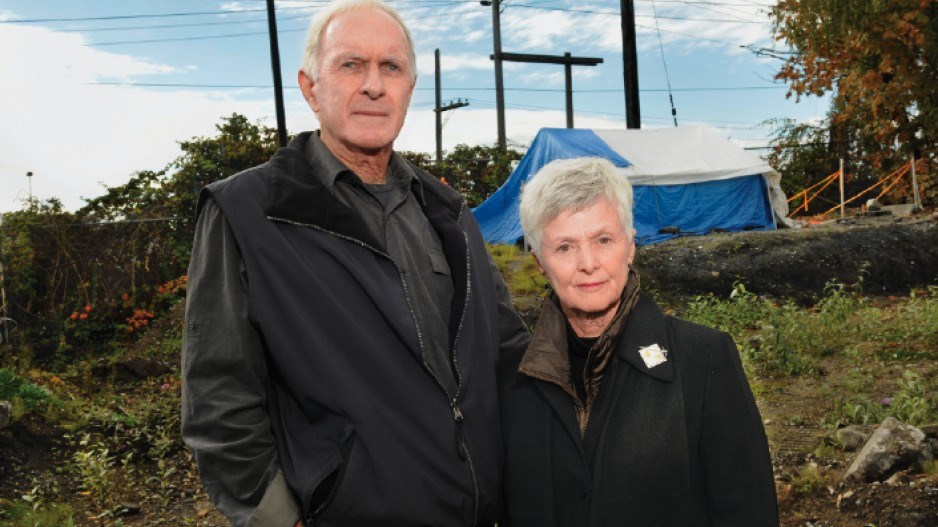Two B.C. seniors are faced with losing their life savings thanks to the B.C. government reversing a decision to allow development on a Vancouver site that they have owned for decades.
Retirees Gary Hackett, 70, and Fran Hackett, 67, partnered with developer Century Group to develop a $42 million, 108-unit condominium tower at 1338 Southwest Marine Drive and were encouraged by governments – until it all changed last month.
In May, the development hit the headlines as work crews discovered human remains on the site, which is recognized as a historic aboriginal midden. Believing the discovered remains were those of their ancestors, the Musqueam protested outside the site to call a halt to development.
The discovery was deemed culturally significant enough to force work to stop, and on September 28, the B.C. government permanently revoked permission to continue development at the commercially zoned site.
But the Hacketts believe other motives are at play. They claim the government’s refusal to extend building permits is a sophisticated way of helping the Musqueam Indian Band buy the land at a bargain basement price so it can be turned into a commemorative park.
“This is a veto – what the government said would never happen,” Gary Hackett told Business in Vancouver. “They’ve given [the Musqueam] a veto on private property.”
Human remains found on other development sites in B.C. have been moved to new burial sites to allow development on private land. But Century Group HQ Development Ltd. (CGHQ), the Hacketts’ and Century Group’s joint company, was not given that option, even though its permit noted that any remains found would be subject to “careful and respectful removal” and be “interred or relocated according to the wishes and protocols of local First Nations.”
Business in Vancouver asked Steve Thomson, minister for forests, lands and natural resource operations, why the Hacketts could not move the remains to a new site. He deferred the question and said it was the decision of “the statutory decision maker” – Thomson’s deputy minister, Doug Konkin.
Sources in the ministry say the reasoning was that the discovery was a substantial find of several intact bodies and that fragments of bone were found elsewhere in the site. Others suggest it was because the Musqueam do not want the remains moved.
CGHQ has spent more than $10 million on the project, which is 75% sold out and provides one-bedroom homes priced from $229,000 – a comparatively low price in a city where affordable housing is purported to be mayor Gregor Robertson’s top priority.
The City of Vancouver issued a development permit for the site in January 2011 even though the land is on a city registry of archeological sites.
But when human remains were found on the site, the mayor cycled to the site, signed the Musqueam’s petition, banged drums with protesters and then tweeted that the “B.C. government must enable land swap, respect ancestors.”
For a while, it seemed as though a complex set of land swaps and compensation agreements between the B.C. government and the Musqueam would give the Musqueam enough cash to buy the CGHQ land at up to $10 million.
The Hacketts say the only offer that the Musqueam have made to buy the property was substantially below that.
The Musqueam band is entitled to compensation from the B.C. government when the Crown sells land that is their traditional First Nation territory, according to the Supreme Court of Canada’s 2004 landmark Haida Nation versus British Columbia (Minister of Forests) decision. It ruled that this must be done when there is an “incremental adverse impact” on First Nations from the sale.
Victoria agreed to provide $4.8 million in cash to the Musqueam instead of $4.8 million worth of land, which was previously agreed as a result of the province building the South Fraser Perimeter Road through Musqueam territory.
More cash is expected to come as TransLink builds the Evergreen Line on Crown land that the Musqueam also claim as traditional territory.
Victoria has accelerated land sales and compensation payouts to the Musqueam, but it is not obliged to ensure that CGHQ is fairly compensated for its property.
Instead, according to Gary Hackett, the government’s decision to allow permits to expire on the site has drastically devalued the property because the condominium project can’t proceed, and it’s unlikely that anyone but the Musqueam would want to buy the land.
However, Musqueam councillor Wade Grant said Hackett’s assumption is off the mark because the $8 million to $10 million price tag would only be the value of the property if development were allowed to proceed.
“The Musqueam’s position is that the project should not have proceeded in the first place,” he said. “We are not prepared to pay because of mistakes that the province or city made by issuing those permits.”




